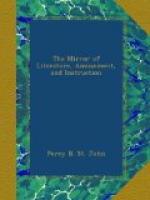“About 30 yeres sence, it hapned in Wilshire, at Juy Church, aboute two myles from Sarisbury, as men digged to make a foundation, they founde an holow stone couered with another stone, wherin they founde a booke, hauevinge in it little above xx leaves (as they saide) of very thicke vellume, wherin was some things written. But when it was shewed to priests and chanons, whiche were there, they could not reade it. Wherfore after they had tossed it from one to another (by the meanes wherof it was torne) they did neglecte and caste it aside. Long after a peece therof happened to come to my handes: whiche notwithstandynge it was all to rente defaced, I shewed to Maister Richard Pace, than chiefe secretary to the kynges moste royal majestie, wherof he exceedingly rejoysed. But because it was partely rente, partely defaced and blourred with meate (or weate) whiche had fallen on it, he could not finde any one sentence perfect. Notwithstandynge after longe beholdynge, he shewed me, it seemed that the said booke conteined some auncient monument of this yle, and that he perceived this woorde Prytania, to be put for Brytannia. But at that tyme he sayde no more to me. Afterwarde, I gevyng much study and diligence to the readynge of hystories, consyderynge wherof this woorde Britannia first came, fyndynge that all the yles in this parte in the occean, were called Brittaniae, after conjecture of Albion, remebringe (remembering) the sayde wrytynge, and by chaunce fyndyng in Suidas, that Prytania in Greeke, with a circumflexed aspiratio (aspiration,) doeth signifie metalles, fayres and markettes, also revenues belongyng to the commune treasure: I then conceyved this opinion, that the Greekes flourishynge in wisdome, prowesse, and experience, of saylynge, beynge entred into the occean sea, founde in the yles greate plenty of tyn, leade, yron, brasse, and in divers places golde and sylver in great quantitie, they called all those yles (isles) by this generall name Prytania, &c.”
I have, with few exceptions, preserved the spelling.
Your constant reader and admirer,
AN ANTIQUARY.
* * * * *
POLAND.
(For the Mirror.)
The following account of Poland, may be acceptable at the present time, when this heroic people are making a noble effort to throw off the yoke of Russian despotism.
As a kingdom, Poland is swept from the map of nations; but when geographically considered, is of no small importance: it lies between forty-six and fifty-seven degrees of north latitude, and between sixteen and thirty-four degrees east longitude; and is bounded north by Russia, south by Hungary and Turkey in Europe, east by Russia, west by Prussia and Germany. Poland is in general a very level country, (if we except the Carpathian mountains,) fertile in corn, having long furnished Sweden and Holland; its horses are some of the finest in Europe, and its salt-works are very productive; the towns collectively are built of wood; the appearance of the villages very mean.




